A Necessary Conversation
Ebrahim Rasool
July/August 2007
Religious liberty is more than the freedom to believe. It is also the freedom to let believe. Religious liberty is more than the freedom to evangelize. Religious liberty is also the responsibility to find the common ground even as you evangelize: that religious liberty has to assert the great spirituality of all human beings while persuading of better ways to reach and to worship God.
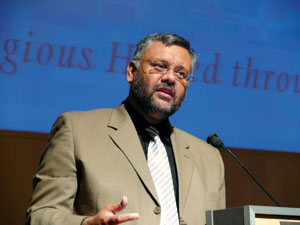
|
|
Ebrahim Rasool, Premier of the Western Cape Province, South Africa
|
The troubled nature of the world manifests itself and justifies itself on the basis of religion, and manifests itself through terrorism, through Islamophobia, through anti-Semitism, through intolerance of a variety of natures across the world. Much of the root causes of all of that is the fact that we who profess a belief in God in one way or the other are the first victims of globalizing uncertainty. The first victim of globalization, the first victim of the onslaught of science, the first victim of the onslaught of technology is often tradition, culture, and religious belief—not because they are mutually exclusive, but because they shake the foundations that we hold so easily; they force us to go back and find the relevance we need to present to the world. In the words of J. K. Galbraith, the Canadian-born American economist: "The more uncertain people are, the more dogmatic they become." This is because they retreat into the few essential truths that they can hold on to, and they become dogmatic about those few essential truths because everything else has changed.
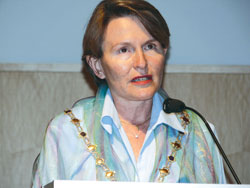
|
|
Cape Town Mayor Helen Zille
|
The family structure has changed. And so often, in Muslim communities, we retreat into one truth about the place of women. In much the same way, our children learn far more quickly from MTV, KTV, and all those kinds of things than they learn from a year of Sunday schools and 10 years of madrassa. And they make us uncertain to the core about whether we can control the emerging generations, their value base, and their behavior—whether we can hold them back from drugs and sexual experimentation, HIV and AIDS. They shake our certainties and the essential beliefs, and unless we reinvent ourselves, we will not be able to speak either to women or to the young. Galbraith is absolutely correct: the more uncertain we become, the more dogmatic we become.
This is the cradle of ideologies of certitude that bedevil the world today. Then it is religion being the fig leaf for ideologies of certitude. This is the birthplace of extremism, and we all know extremism: it labels because it cannot debate and argue. It fights because it has forgotten how to love. It isolates and condemns because it doesn't know how to unite and find common ground. And it has perfected the art of dying for a cause because it cannot live for a cause.
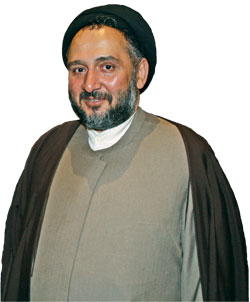
|
|
Mohammad Ali Abthi from Iran
|
The religious dialogue and trialogues and quadrologues that we require, the conversations we require, are not simply among Christians, Muslims, Hindus, Jews, Jains, Sikhs, etc. The conversations we need are conversations of mind-sets across all religions, because extremism—fundamentalists in Christianity, in Islam, in Judaism, in Hinduism, or any other religion—speaks far more of a common language than progressive and well-meaning people across all of those religions. Extremists have their own conversations: they slug it out on the battlefields of Iraq; they slug it out in Afghanistan, in Pakistan, or wherever the case may be. They speak that language to each other because they are essentially the same—even if they raise a Christian flag here, a Jewish flag there, and a Muslim flag there.
Traditionalists have their own conversations. They retreat into the churches, the mosques, the synagogues, and the temples, hiding from the world, unable to deal with this world. They have their own conversations because across all the religions, they have the same language.
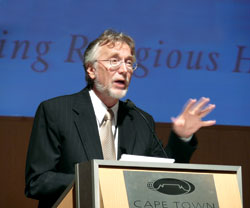
|
|
IRLA director Dr. John Graz
|
And those of us who believe that religion remains essential to the world, that its values would be the savior of the world, that its behavior is going to be critical to temper the excesses of globalization and give the common poor people something to hold on to both in this world and the hereafter—we have to fashion a conversation that crosses the formal lines of division among Muslims, Christians, Hindus, Jews, etc. And unless we find one another, the world will be condemned.
The key to it is, I believe, in what the Koran teaches when it says: "[Arabic phrase]," when God says "I have blown of My spirit into you." And in the same vein, when in the first Epistle of John, he says, "Who lives in love, lives in God and God in him." And it ends up by saying, "This I say to you: I have given you My spirit."
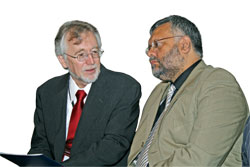
|
|
Dr. John Graz in conversation with Premier Rasool
|
If the Koran says that God has given of His Spirit to each human being, and in John it is declared that God's Spirit is left for each person, then we begin to get the answer. We can only go forward if we recognize that each one of us carries a part of the Spirit of God in us—that when we speak to one another, we don't speak to the Muslim dress that the one wears and the clerical clothes that Catholics wear, or the garbs that the Hindus wear, whatever. We aren't speaking to their clothes: we are speaking to the divine in each one of them. We are not speaking to the Muslim fez and the Christian collar, whatever the case may be; we are speaking to the divine in each one of them. And even as we differ formally, the common ground is that each one of us carries the Spirit of God within us and is worthy of respect, is worthy of love, and is worthy, at the very least, of tolerance.

Premier of the Western Cape Province, South Africa, Ebrahim Rasool, a Muslim, has been in office since 2002. These comments were part of a speech he gave at the IRLA World Congress in Cape Town earlier this year.





